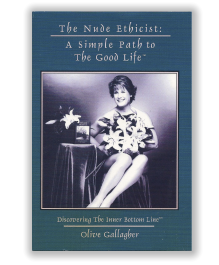Starting Over…Again
Dear Olive,
I started to write out my New Year resolutions right after I read one of your earlier column on just this topic and realized I’ve been making the same ones for years. I always start out feeling real jazzed up, ready to lose ten pounds, go to the gym, make quiet time for myself, even cut my hair. But by March it falls apart. I remember something you wrote about “if you start to see yourself coming in the rear view mirror” but I can’t remember the rest. So I’m asking for help. Why does this always happen? What’s wrong with me? I don’t want to fail again.
P.L.
Dear P.L., First of all, there’s nothing wrong with you. And take heart. You’re not alone. About 90% of the population right now are wrestling with this issue.
The statement you kindly remembered was “if you see yourself coming in a rear view mirror, chances are you’ve traveled this road before.” There are lessons in life we find ourselves repeating over and over until we figure out what we need to know. That doesn’t make us wrong or stupid or a failure. It just means we have more work to do and that we’ll keep repeating things until we get it. The fact that you keep trying is admirable and brave. But I think it would help to back up a bit. Because it’s really about figuring out what isn’t working. Then figuring out what will.
Most resolutions don’t work because they’re desired end results, not issues. We end up not starting back far enough on the track to get to the finish line. To get at real issues we want to change, we have to start over at the source. So it helps to begin by defining smaller, more possible goals. Weight or hairdos aren’t usually sources but symptoms of something much bigger and complex. The issue is more about how and why you see yourself the way you do. How you feel about what you see. Even perhaps who you’re trying to please or impact by changing things.
Since you haven’t given me any background about your reasons for making the resolutions you did, it would be professionally irresponsible of me to blithely offer one-sentence solutions, and the additional advise of a therapeutic professional might prove appropriate to you in the future. For instance, I don’t know if you need to lose weight because you’re clinically overweight or perhaps have an underlying emotionally based eating disorder you haven’t dealt with yet. Or if you’re just unhappy because you don’t (and can’t) look like your favorite superstar. What I do know, however, is that many of us battle one or more of these demons everyday, and that it’s nonproductive to lay blame or shame upon ourselves if we do. Our image/youth conscious culture never gives us relief from our icons’ pictures of perfection.
Change is a tricky thing. It’s one of the few constants in life that you can count on it – like death and taxes. But with every change comes more change. In the end, the only changes we end up sticking with are priorities. Things we’re willing to make tradeoffs for to get the end results we want, no matter what. We don’t stay committed to things unless they’re “do or die” things. Unless keeping them is an absolute necessity to our well-being and sense of self.
Our priorities, along with our most precious values and ethics, reside on our Inner Bottom Line, the place you’re standing right now because you’ve reached a breaking point where it’s not acceptable or bearable to you to fail again. So something has to change. If you honor your ethics, they’ll demand you treat yourself with fairness, respect, honesty and integrity. So what can you do, and how can you do it, in order to be fair with yourself, respectful of what you can achieve, and honest with why you feel compelled to try.
What do you believe in and care about most that you’re willing to commit to, struggle for, sacrifice for, and stick with? Do you really want to give up cake or ice cream to be ten pounds thinner? The answer lies in whether or not feeling leaner feels better than swallowing sugar. Is that a trade off you can stick to and live with? Because there is always a price. The challenge is to figure out what we’re willing to trade in for what we think we want. All the rest, well, there just isn’t enough energy or desire to cover the tab.
So tear up that list and start over. Make a list of essential things that you value most. In the end, vanity usually comes in second to feeling good. Then redefine them in doable terms. Instead of a vague “spend more quiet time with myself,” get specific. Does that mean spending time in total silence or in nature, reading or gardening, or listening to a symphony? Maybe it’s a little bit of some or all of these things. Determining what something feels and looks like helps you choose activities that will provide what you need.
Finally, list the things you need to do to keep them, have them or get them and how you feel about the efforts it will require. And remember: be good to yourself and try to do what’s good for you. Good luck and Happy New Year!
Olive










